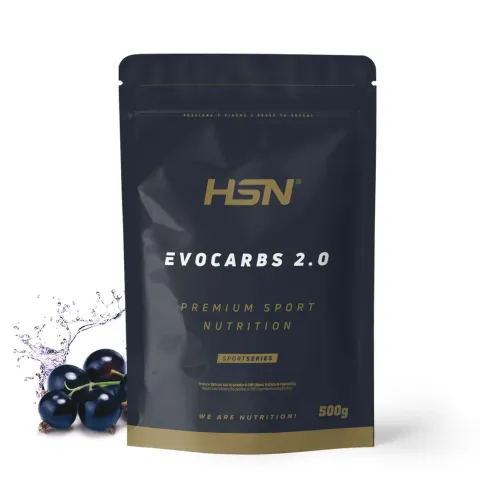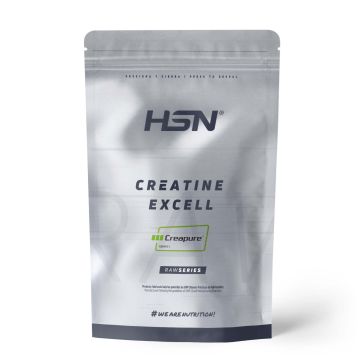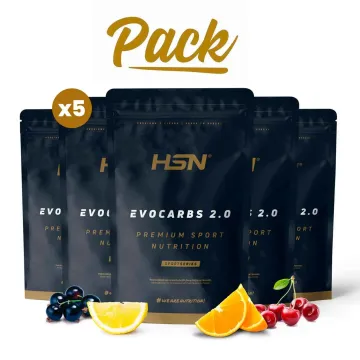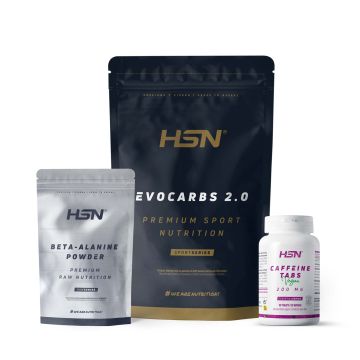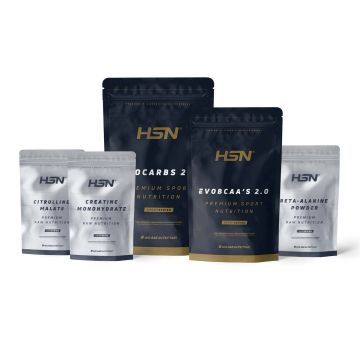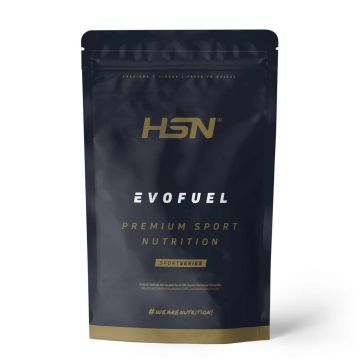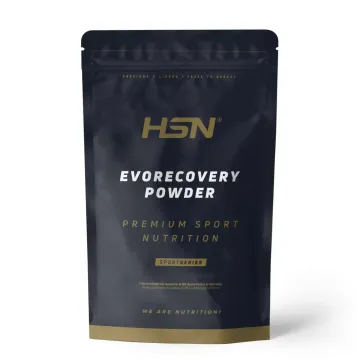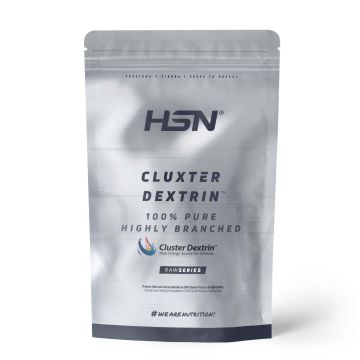- Evocarbs 2.0 is HSN's 'all-terrain' isotonic drink - Adaptable to all types of needs.
- Complete formula with carbohydrates and electrolytes for hydration replenishment.
- Combination of simple + complex carbohydrates for maximum nutritional quality.
- With combined forms of glucose and fructose for total and efficient absorption.
- Provides Chloride - Sodium and Magnesium. The main electrolytes lost through sweat.
- Measured osmolality, certified as authentic isotonic to replenish fluid losses.
- Available in delicious flavours and various sizes. Choose the one that suits you best.
- Good solubility | Allergen-free | Sweetness and flavour intensity adjusted for a better experience.
Evocarbs 2.0 is the isotonic powder you need
Evocarbs 2.0 from SportSeries is a ready-to-reconstitute isotonic powder to prepare your isotonic drink, right when and where you need it. Its formula is developed with different types of carbohydrates, sweetener and mineral salts to achieve a complete composition that meets all the needs an isotonic drink should provide to effectively and adequately replenish the loss of fluids and nutrients through physical exercise.
Physical exercise, especially in hotter and more humid environments, causes a significant metabolic change, which is an increase in sweating rate, with the consequent loss of fluids and electrolytes. To maintain athletic performance and general health during sports, it is necessary to replenish these losses, and the most effective way to do this is through isotonic drinks, such as Evocarbs 2.0, which have a set of nutritional conditions that optimise the replenishment of nutrients lost through exertion.
Evocarbs 2.0 has been formulated following the recommendations of the top international sports nutrition experts to provide you with everything you need in intra-training nutrition.
A genuinely high-quality isotonic powder drink
Combination of carbohydrates with different absorption rates
Decades ago, isotonic drinks were prepared with sugars such as glucose, fructose, or sucrose.
This remains a common practice since they are effective carbohydrate sources for developing isotonic formulas. However, their use has associated issues, for example:
If an isotonic drink is developed exclusively with simple sugars, its osmolal reactivity is very high, and this causes consumption, even in small amounts, to produce digestive discomfort, diarrhoea, and other problems related to increased intra-intestinal osmolality.
However, complex carbohydrates are more 'difficult' to handle because not all, nor the majority, are suitable for regular consumption during training. What does this mean? Think of a complex carbohydrate, possibly the most typical, starch. Can you imagine drinking a beverage with flour during training? That's impossible, it's too heavy to digest.
So how are complex carbohydrates added to an isotonic drink? Through so-called 'new generation' carbohydrates, which are complex carbohydrates with characteristics more similar to simple carbohydrates:
In Evocarbs 2.0, we use maltodextrin, a glucose polymer with intermediate-length linear chains, which avoids the intestinal osmolal reactivity that simple carbohydrates produce but at the same time, hydrolyses easily and quickly for rapid gastric emptying and efficient absorption without heaviness or digestive discomfort.
Take advantage of the combination of simple carbohydrates (ultra-fast absorption) and complex carbohydrates (medium-fast absorption) to make the most of all the benefits this nutrient provides at an energy level during your training and competitions.
With sources of glucose and fructose for maximum benefit
Sports nutrition around training has improved over the years, being refined as discoveries are made, one of the most reputable authors in this field is Asker Jeukendrup.
Jeukendrup explains in his scientific studies a concept that revolutionised intra-training nutrition and completely changed the focus of sports drinks: the intestine has a limited capacity to transport glucose into the blood.1
One way to increase this capacity and additionally utilise other transporters in the intestine is to add fructose to the drink, as it shares the energy and glycogen replenishment functions of glucose but is absorbed by additional transporters, allowing the absorption limit of around 60-90g of carbohydrates to increase to approximately 90-120g.
At HSN, we stay fully updated with the latest scientific evidence to develop the best products on the market, those that best meet the needs of users who want to use them.
This is why Evocarbs 2.0 contains different sources of monosaccharides, both dextrose and fructose, in its composition, for maximum benefit.
Complete range of mineral salts for total replenishment
Evocarbs 2.0 contains different important electrolytes for body hydration, considered essential during sports practice to maintain good nutritional balance.
These are:
- Chloride.
- Sodium.
- Magnesium.
They come from the salts:
- Sodium chloride.
- Sodium citrate.
- Magnesium malate.
And they are an excellent way to replenish necessary elements for hydration that you seek in a carbohydrate and electrolyte-based, isotonic drink for sports practice.
Adjusted osmolality - Isotonic certified by Osmometry
When a drink is isotonic, its state can be evaluated in different ways, many of which simply assess that the % of solutes is less than 8% in the final solution. However, this implies that the drink's osmolarity is adjusted, but not necessarily its osmolality.
At HSN, we have conducted studies with specific tools that have allowed us to certify that the drink's osmolality is adjusted to a real isotonic solution with the necessary adjustment of 200-330mOsm/kg.
So you can rehydrate properly with a truly real isotonic drink.
What are the properties of an isotonic drink and why use it?
When we talk about isotonic, we refer to carbohydrate-based electrolyte solutions that must meet the following conditions:
Contain between 80 Kcal/l and 350 Kcal/l from carbohydrates, and at least 75% of the energy must come from carbohydrates that cause a high glycaemic response. Additionally, contain between 20 mmol/l (460 mg/l) and 50 mmol/l (1,150 mg/l) of sodium, and have an osmolality between 200 mOsm/kg and 330 mOsm/kg of water.
Evocarbs 2.0 meets these conditions and is therefore a genuine isotonic drink with the following characteristics:
- Helps maintain endurance levels in activities that require prolonged endurance.
- Improves water absorption during physical exercise.
Important factors for an athlete seeking to maintain their health and athletic performance in optimal conditions during training sessions and/or competitions.
Evocarbs 2.0 is an isotonic drink adaptable to any type of discipline
It is common to wonder what type of intra-training drink is best for each modality. There is also a lot of mysticism about it.
The truth is that a well-developed isotonic drink, like Evocarbs 2.0, is very versatile and applicable to all types of sports disciplines, including Endurance activities (such as athletics or cycling), team sports (like football or basketball), combat sports, and even strength and power sports (like CrossFit®).
Other options like Evotonic are also valid for all types of sports practices, but are particularly useful in higher-demand modalities, with longer durations, such as stage cycling or ultra-endurance events due to the presence of amino acids in their composition.
For most sports disciplines, Evocarbs 2.0 is perfect.
With flavours adjusted so they are not excessively sweet
One of the main problems we face as athletes when consuming an isotonic drink is flavour adjustment, and at HSN, we know this because we are athletes ourselves who use the products we develop. Here's how it works:
An isotonic powder solution, like Evocarbs 2.0, must be mixed with a specific amount of water, as it is not a product like others, such as a protein powder, where the recommended water amount is indicative and you, as a consumer, can choose to mix it with more or less liquid depending on the intensity of the flavour, sweetness, and consistency.
In isotonic drinks, the osmolality is adjusted in the final solution, that is, Evocarbs 2.0 is isotonic as long as you follow the recommended usage method:
'Mix 2 scoops of 30ml (approx. 40g) with 500ml of water'
If you mix more Evocarbs 2.0 in less water, the osmolality increases, turning it into a hypertonic solution; whereas if you mix less Evocarbs 2.0 in more water, the solution becomes hypotonic.
With such specific usage ranges, the flavour must be well achieved, as if it is too sweet, intense, or mild, you cannot adjust the amount of water in which you mix the formula.
All Evocarbs 2.0 flavours have been meticulously tested and adjusted to achieve a perfect balance, so you love each one of them and can enjoy them chilled in your intra-training drink without difficulty adjusting the flavour.
How to use Evocarbs 2.0 in the best possible way?
There are different ways to use Evocarbs 2.0 as despite its primary use being intra-training, you can also use it before training to provide important nutrients for your body to face the intensity of a hard training session or competition optimally.
Many people also use it as a post-training carbohydrate source, to help restore normal muscle function (the beneficial effect is obtained by consuming carbohydrates from all sources in a total intake of 4g per kg of body weight, in doses taken before four hours (or, at most, six) after completing high-intensity or long-duration physical exercise leading to muscle fatigue and the depletion of glycogen stored in skeletal muscles.
The best way to use Evocarbs 2.0 is during training, despite its possible peri-training uses.
The way to use Evocarbs 2.0 during the session is based on:
- Ensuring sufficient liquid consumption to replenish losses, which often involves a variable volume between 600ml and 1.5l. Whether 100% of this liquid volume comes from the isotonic drink or a combination of isotonic and water is your choice.
- Helping to reach the consumption of 60-120g of carbohydrates per hour during sports practice.
This is why the way to prepare Evocarbs 2.0 is:
- For each hour of training or competition, from 60-90 minutes onwards, mix 2 scoops with 500ml of water; you can use between 2 and 6 per hour depending on the demands of the event and how accustomed you are to consuming sports drinks during practice, also depending on your sweating rate and the amount of water you need to consume to stay adequately hydrated.
Combine Evocarbs 2.0 with specific gels and bars
If you want to complement your carbohydrate intake with more options, you can add Gels and Bars to Evocarbs 2.0.
You have different options:
All HSN products at your fingertips!
Looking for a formula with amino acids? Evotonic is for you!
Evotonic is similar to Evocarbs 2.0 in that it is also a powdered isotonic formula for the preparation of carbohydrate and electrolyte-based solutions. However, its composition is different and considered more 'advanced'.
The reason for this is that it contains Peptopro®, which is a highly hydrolysed protein source, as well as amino acids.
All of this is designed so that Evotonic is the best solution for people who have high wear and tear, in ultra-endurance events, in particularly hot or humid environments.
Scientific Bibliography
- Kanter, M. (2018). High-Quality Carbohydrates and Physical Performance. Nutrition Today, 53(1), 35–39.
- Jeukendrup, A., Brouns, F., Wagenmakers, A. J., & Saris, W. H. (1997). Carbohydrate-electrolyte feedings improve 1 h time trial cycling performance. International Journal of Sports Medicine, 18(2), 125–129.
- Phillips, S. M., Turner, A. P., Sanderson, M. F., Sproule, J., & Ward, S. A. (2012). Carbohydrate gel ingestion significantly improves the intermittent endurance capacity, but not sprint performance, of adolescent team games players during a simulated team games protocol. European Journal of Applied Physiology, 112(3), 1133–1141.
- Jeukendrup, A. E. (2004). Carbohydrate intake during exercise and performance. Nutrition, 20(7–8), 669–677.
- Mata, F., Valenzuela, P. L., Gimenez, J., Tur, C., Ferreria, D., Domínguez, R., … Sanz, J. M. M. (201 9). Carbohydrate availability and physical performance: physiological overview and practical recommendations. Nutrients, 11(5).
- Lara, B., Gallo-Salazar, C., Puente, C., Areces, F., Salinero, J. J., & Del Coso, J. (2016). Interindividual variability in sweat electrolyte concentration in marathoners. Journal of the International Society of Sports Nutrition, 13, 31.
 Before
Before After
After During
During Morning
Morning Afternoon
Afternoon Night
Night Before
Before After
After During
During Morning
Morning Afternoon
Afternoon Night
Night Before
Before After
After During
During Morning
Morning Afternoon
Afternoon Night
Night Before
Before After
After During
During Morning
Morning Afternoon
Afternoon Night
Night Before
Before After
After During
During Morning
Morning Afternoon
Afternoon Night
Night Before
Before After
After During
During Morning
Morning Afternoon
Afternoon Night
Night Before
Before After
After During
During Morning
Morning Afternoon
Afternoon Night
Night Before
Before After
After During
During Morning
Morning Afternoon
Afternoon Night
Night Before
Before After
After During
During Morning
Morning Afternoon
Afternoon Night
Night Before
Before After
After During
During Morning
Morning Afternoon
Afternoon Night
Night Before
Before After
After During
During Morning
Morning Afternoon
Afternoon Night
Night Before
Before After
After During
During Morning
Morning Afternoon
Afternoon Night
Night Before
Before After
After During
During Morning
Morning Afternoon
Afternoon Night
Night Before
Before After
After During
During Morning
Morning Afternoon
Afternoon Night
Night Before
Before After
After During
During Morning
Morning Afternoon
Afternoon Night
Night Before
Before After
After During
During Morning
Morning Afternoon
Afternoon Night
Night Before
Before After
After During
During Morning
Morning Afternoon
Afternoon Night
Night Before
Before After
After During
During Morning
Morning Afternoon
Afternoon Night
Night Before
Before After
After During
During Morning
Morning Afternoon
Afternoon Night
Night Before
Before After
After During
During Morning
Morning Afternoon
Afternoon Night
Night Before
Before After
After During
During Morning
Morning Afternoon
Afternoon Night
Night Before
Before After
After During
During Morning
Morning Afternoon
Afternoon Night
Night Before
Before After
After During
During Morning
Morning Afternoon
Afternoon Night
Night Before
Before After
After During
During Morning
Morning Afternoon
Afternoon Night
Night Before
Before After
After During
During Morning
Morning Afternoon
Afternoon Night
Night Before
Before After
After During
During Morning
Morning Afternoon
Afternoon Night
Night Before
Before After
After During
During Morning
Morning Afternoon
Afternoon Night
Night Before
Before After
After During
During Morning
Morning Afternoon
Afternoon Night
Night Before
Before After
After During
During Morning
Morning Afternoon
Afternoon Night
Night Before
Before After
After During
During Morning
Morning Afternoon
Afternoon Night
Night Before
Before After
After During
During Morning
Morning Afternoon
Afternoon Night
Night







